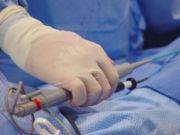Article
Colchicine Treatment Reduces Atrial Fibrillation Recurrence
Author(s):
Study results show that a three-month course of colchicine can significantly reduce the recurrence of atrial fibrillation after catheter ablation.

A new study from Greece finds that a three-month course of colchicine can significantly reduce the recurrence of atrial fibrillation after catheter ablation.
The study, “Colchicine for Prevention of Atrial Fibrillation Recurrence after Pulmonary Vein Isolation: Mid-Term Efficacy and Effect on Quality of Life,” was published in Heart Rhythm.
Those findings support both the very similar conclusions of another Greek study from 2012 and, less directly, a widely reported study published in Circulation that found colchicine could reduce the occurrence of atrial fibrillation after heart surgery.
In the most recent Greek study, 223 patients who all underwent a single procedure of pulmonary vein isolation to treat paroxysmal atrial fibrillation were randomly divided into two equal-sized groups. Patients in one group received 0.5 mg of colchicine, twice a day, for three months. Patients in the other group received placebos.
Atrial fibrillation recurred in 31.1% (32 of 103) in the colchicine group and 49.5% (51 of 103) in the control group.
Study authors, who followed the median patient for 15 months, calculated a relative risk reduction of 37% (odds ratio 0.46; 95% confidence interval 0.26-0.81) and a number-needed-to-treat of 6 (95% confidence interval 3.2-19.8).
In addition to monitoring recurrence rates, the study compared quality of life for both groups‑‑as measured by the 26-item World Health Organization QoL questionnaire‑‑at baseline, 3 months and 12 months.
QoL scores related to physical health were 63.6 ±13.8 at 12 months in the colchicine group and 52.5 ±18.1 in the control. Domain scores related to psychological health were 56.1 ±13.7 in the colchicine group versus 44.7 ±17.3 in the control (p<0.001, for both).
: A Randomized Controlled Study
In the earlier Greek study, “Colchicine for Prevention of Early Atrial Fibrillation Recurrence After Pulmonary Vein Isolation ,” published in the Journal of the American College of Cardiology, many of the same researchers randomized 161 patients who received radiofrequency ablation for paroxysmal atrial fibrillation into two groups that received three months of colchicine or placebo.
After those three months, atrial fibrillation recurred in 13 of 81 (16%) in the colchicine group versus 27 of 80 (33.5%) of patients of the placebo group (odds ratio: 0.38, 95% confidence interval: 0.18 to 0.80).
In the study of colchicine’s effects on the frequency of postoperative atrial fibrillation, 336 patients were assigned at random to receive either placebo or colchicine on the third day after heart surgery and for a month thereafter.
At 12 months, the incidence of atrial fibrillation was 8.9% among the colchicine group and 21.1% among the placebo group.
Researchers calculated that colchicine reduced the relative risk of developing postoperative atrial fibrillation by 42.1% (P=0.002) and that the number-needed-to-treat was 8.
Colchicine is naturally found in the extract of a plant called the autumn crocus, an extract that was used for centuries to treat gout. (It was first recommended for that use around the time of Christ by the Greek botanist Pedanius Dioscorides.) A purified form has been on the market since 1833, but the US Food and Drug Administration did not formally approve it until 2009.
Colchicine appears to treat gout not only by reducing the formation of uric acid crystals in the joint space but also by reducing the inflammation itself.
Researchers hypothesize that it is this anti-inflammatory action appears to enable the drug to stave off atrial fibrillation and might prove helpful in other situations.





